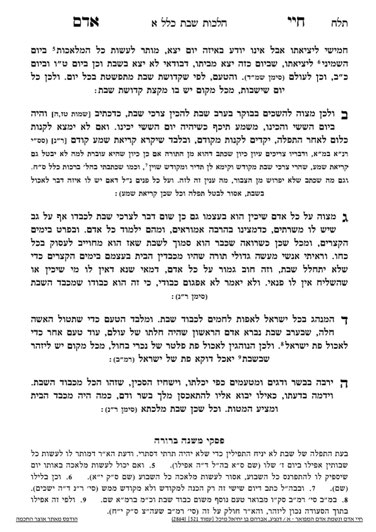We are continuing in siman 3, which discusses the concept of kavod Shabbos. Yesterday, we learned that the Gra explains that the Rambam understands that the mitzvah of kavod Shabbos applies primarily before Shabbos, while oneg primarily applies on Shabbos itself.
We can learn a fascinating point from the Gra. We have a concept of hechsher mitzvah, preparing for the mitzvah and making it available to be performed. Examples include buying a lulav or building a sukkah. One could have thought that the only mitzvah in question is oneg Shabbos, and anything done before Shabbos is a hechsher for oneg Shabbos. The Gra is pointing out that the preparations are a separate, inherent mitzvah on their own. When one prepares before Shabbos, they are giving kavod to Shabbos.
Many have the minhag that when they eat foods on Shabbos, they preface the food with the statement lekovod Shabbos kodesh. Similarly, we learned that when a person purchases items, they should state that they are for Shabbos (S0002). It is also relevant here, in that before one cleans their house, they should state that they are doing so lekovod Shabbos kodesh.
It is interesting that, according to the Gra, when one eats food on Shabbos, arguably, they should state le’aneig Shabbos kodesh (for the sake of the oneg of Shabbos), rather than lekovod, since the primary mitzvah is oneg Shabbos, according to the Gra.
Rav Moshe Feinstein has a teshuva regarding time clocks. Many do not follow his psak regarding them; however, he discusses the concept of zilusa d’Shabbos, degrading Shabbos. He writes that the Rambam agrees with many other rishonim who hold that the mitzvah of kavod Shabbos is a mitzvah deoraysa. As we learned (S0008), a navi cannot create new halachos, but can expand and clarify a mitzvah already hinted to in the Torah or passed down as halacha lemoshe misinai. For example, Sefer Yechezkel mentions halachos regarding the proper way to wear the bigdei kehuna. The Gemara explains that Yechezkel was not creating new mitzvos. Rather, these halachos were passed down as halacha lemoshe misinai, and Yechezkel was recording them. Rav Moshe explains that the Rambam agres that the mitzvah of kavod should be understood in this manner as well; that is, as a mitzvah deoraysa which is explained by the navi. If so, the opposite of kavod, which is zilzul Shabbos, is a mitzvah deoraysa.
To answer our question, it would seem that, based on Rav Moshe, it would not be inappropriate to say lekovod Shabbos kodesh, because we see that kavod applies on Shabbos itself as well, even according to the Rambam. It would still seem more appropriate to state le’aneig Shabbos kodesh, but, seeing that the minhag yisroel is to state le’kavod Shabbos kodesh, one should not deviate from the minhag.
Thus, we see that there is a concept of kavod Shabbos, which in many ways is an expansion of zachor es yom haShabbos. In the next few paragraphs, the Chayei Adam will write more examples of proper kavod Shabbos.
Summary
- The mitzvah of kavod Shabbos is to be involved in the preparations for Shabbos, and is a mitzvah in and of itself. It primarily applies before Shabbos, but applies on Shabbos as well, such as the idea of stating lekovod Shabbos kodesh before eating foods on Shabbos.
- There is an issur of zilusa d’shabbos, to insult or degrade Shabbos through our actions, which is an outgrowth of kavod Shabbos.



